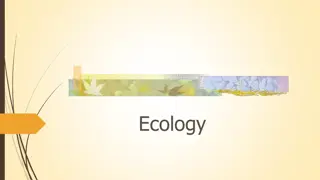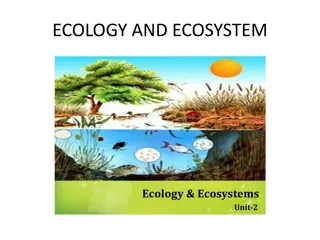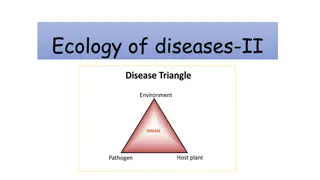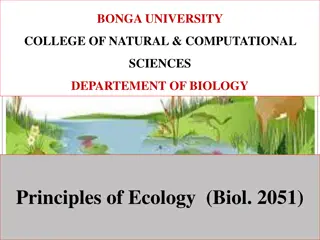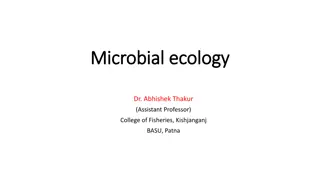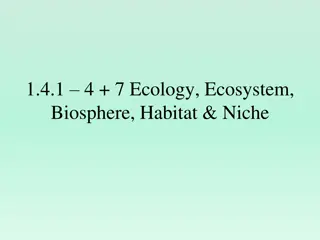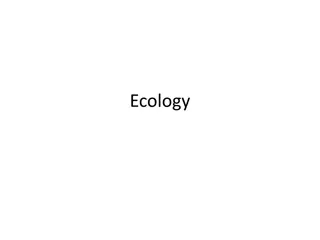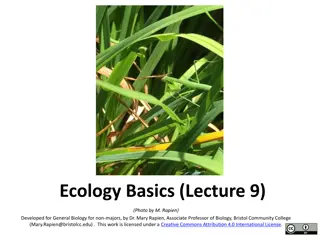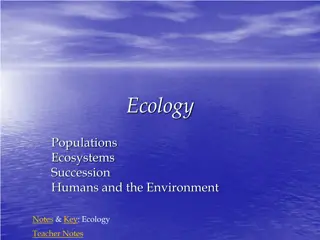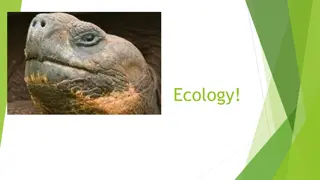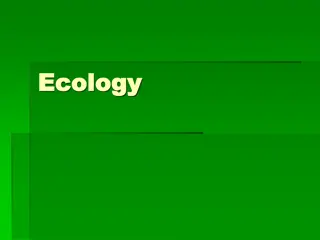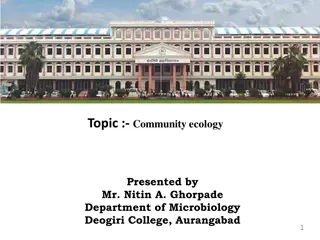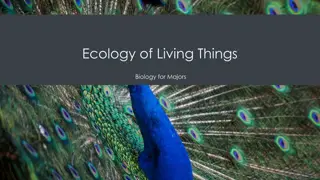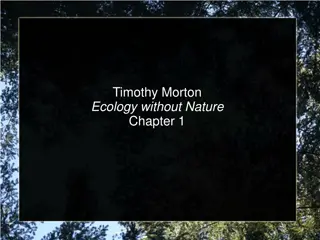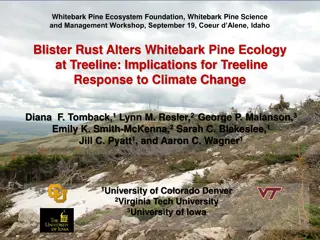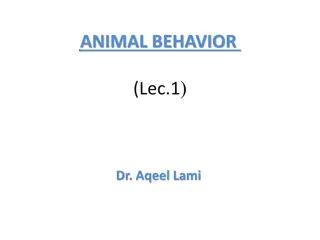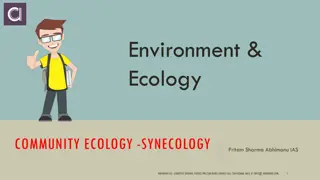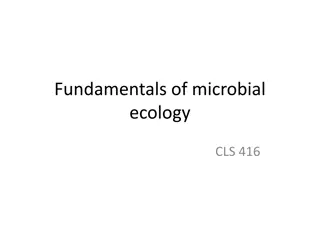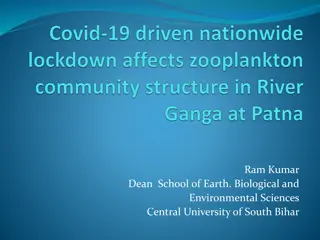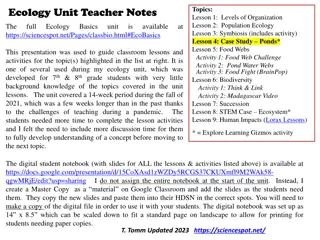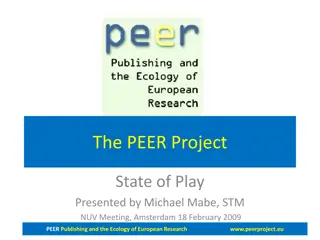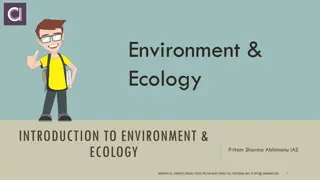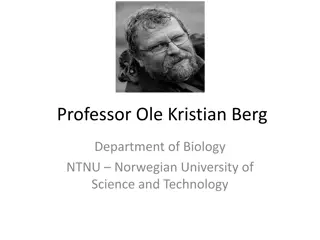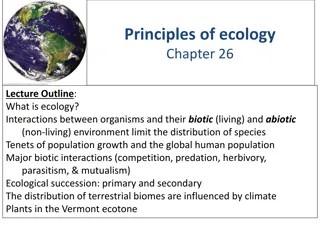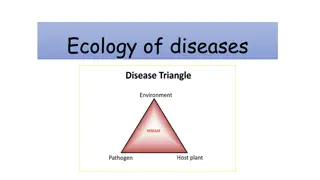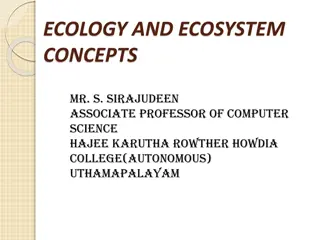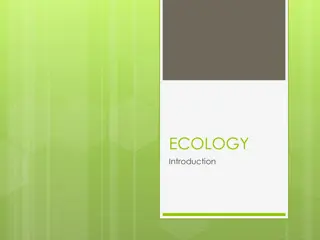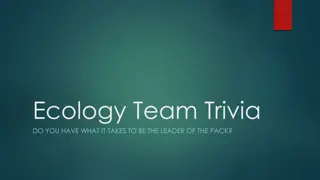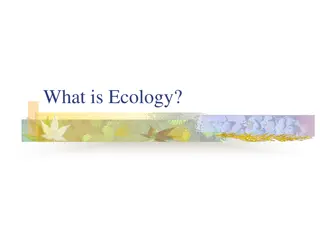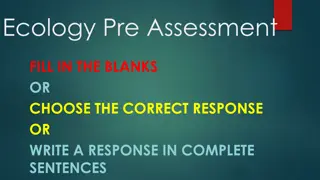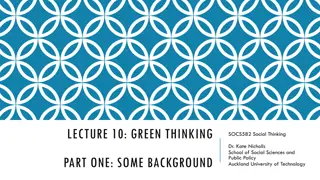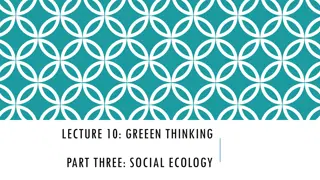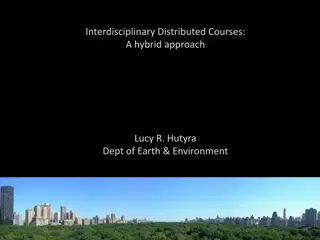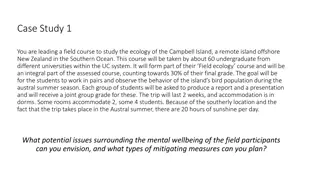Ecology: Interactions Between Organisms and their Environment
Ecology is the scientific study of how living organisms interact with each other and their environment. It delves into the relationships between biotic and abiotic factors, encompassing topics such as the distribution and abundance of organisms, structural adaptations, behavior under natural conditi
4 views • 42 slides
Ecosystems: Ecological Interactions and Dependencies
Ecology is the study of how organisms interact with their environment, influencing their distribution and abundance. This exploration covers terrestrial and aquatic biomes, energy flow, environmental impacts, adaptations, and global ecosystems, emphasizing the interconnectedness of all living organi
2 views • 58 slides
Fish Ecology: Interactions, Diversity, and Environmental Factors
Fish ecology involves studying the distribution, interactions, and abundance of fish species in different ecosystems. This lab delves into the divisions of ecology, fish species diversity in marine and freshwater ecosystems, and the environmental factors affecting fish diversity and abundance. Disco
1 views • 7 slides
Ecology and Ecosystem: A Comprehensive Overview
Ecology, derived from the Greek word "oikologie," explores the interactions between organisms and their environment. The study encompasses various branches like human ecology, population ecology, and habitat ecology, focusing on the relationships within ecosystems. An ecosystem, defined by A.G. Tans
1 views • 68 slides
Ecosystems and Disease Ecology
Explore the diverse types of ecosystems, including autochthonous, anthropurgic, and synanthropic ecosystems, and their impact on disease ecology. Learn about biotopes, biocenosis, ecological mosaics, and ecological interfaces, and discover how infectious diseases can be transmitted across these inte
0 views • 10 slides
Media Ecology: Impact of Communication Technology
Media ecology is a theoretical concept analyzing the influence of media and communication technology on human culture. Neil Postman, a prominent figure in the field, delves into how communication media affect human perception, understanding, and values. This study views media as environments shaping
7 views • 23 slides
Principles of Ecology: Understanding Organism-Environment Interactions
Ecology is the scientific study of how living organisms interact with each other and their environment. It involves understanding organisms at their native habitats, from individuals to ecosystems. The discipline encompasses various branches and focuses on the relationships shaping the distribution
1 views • 14 slides
Microbial Ecology: Interactions and Associations in Ecosystems
Interactions of organisms in ecosystems play a crucial role in the functioning of microbial ecology. Dr. Abhishek Thakur explores symbiosis, mutualism, syntrophism, commensalism, predation, and parasitism, shedding light on how different organisms interact with each other and their physical environm
1 views • 9 slides
Ecology and Ecosystems
Discover the definitions and concepts of ecology, ecosystems, biosphere, habitats, and niches. Learn how living organisms interact with each other and their environment, explore different types of ecosystems, and understand the global ecosystem known as the biosphere.
0 views • 20 slides
Ecology and Basic Concepts in Environmental Science
Explore the fundamental concepts of ecology and environmental science, including species, habitat, population, community, autotrophs, heterotrophs, environment components, food chains, and trophic levels. Learn about the intricate relationships between living organisms and their surroundings in this
0 views • 35 slides
Ecology: Ecosystems, Biodiversity, and Energy Flow
Explore the intricate world of ecology through topics such as ecosystems, biodiversity, energy flow, and nutrient cycling. Delve into the concept of niches, biodiversity levels, and the importance of energy flow and materials cycling in sustaining ecosystems. Learn about the nitrogen and carbon cycl
1 views • 18 slides
Ecology: Populations, Ecosystems, and Relationships
Explore key concepts in ecology including populations, population size and density, dispersion patterns, population growth, habitat and niche relationships, symbiosis, ecosystem energy flow, and roles of producers, consumers, and decomposers.
1 views • 27 slides
Ecology: Interactions in Ecosystems
Explore the intricate web of interactions in ecosystems through the study of ecology. Learn how biotic and abiotic factors shape ecosystems, trace energy flow, and understand nutrient cycles. Discover the importance of biodiversity and the impact of human activities on the biosphere. Dive into topic
0 views • 51 slides
Ecology: Interactions in Nature
Ecology entails the study of interactions among organisms and their environment, from the biosphere to ecosystems, populations, communities, and habitats. It includes concepts like competition and limiting factors that impact species survival and population dynamics.
0 views • 30 slides
Community Ecology: Interactions in Ecosystems
Community ecology, as presented by Mr. Nitin A. Ghorpade, delves into the dynamics of species interactions within ecosystems. It covers concepts like communities, individualistic vs. interactive hypotheses, interspecific interactions, predation, parasitism, plant defenses against herbivores, and mor
0 views • 23 slides
Ecology: Interactions and Environments in Biology
Ecology is the study of interactions between living organisms and their environment. It involves levels of research such as animal ecology, plant ecology, and more, while also exploring the biosphere's impact, biogeography, species distribution patterns, and energy sources like sunlight. Ocean upwel
1 views • 80 slides
Rethinking Ecology: Nature's Role in Human Society
Timothy Morton's "Ecology without Nature" challenges the traditional concept of "nature" and its interference with ecological progress in society. Through thought-provoking narratives and philosophical perspectives, Morton argues for a reevaluation of our relationship with the environment, emphasizi
3 views • 23 slides
Implications of Whitebark Pine Blister Rust on Treeline Ecology
Blister rust is impacting whitebark pine ecology at treeline locations, affecting community dynamics and response to climate change. Whitebark pine serves as a crucial nurse tree and tree island initiator in Rocky Mountain communities. The decline in whitebark pine due to blister rust disrupts its r
1 views • 29 slides
Animal Behavior and Ecology
Animal behavior encompasses a range of activities such as feeding, breeding, and social interactions. Ethology focuses on studying behavior in natural environments, while behavioral ecology examines ecological aspects like predator-prey interactions. Sociobiology delves into the evolution of social
3 views • 5 slides
Biotic Communities in Ecology
Biotic communities play a crucial role in ecology, representing interactions among different species sharing the same habitat. This interdependence is essential for the survival and balance of various organisms in nature. Each community has unique characteristics, such as species composition, reflec
0 views • 17 slides
Microbial Ecology and Ecosystem Components
Study the diverse relationships of living organisms in their environment, focusing on microbial ecology, ecosystem components, and evolutionary adaptations. Explore the dynamics of abiotic and biotic factors, including producers, decomposers, and consumers, and the types of interactions shaping popu
1 views • 7 slides
Ecology Study of Gangetic River Dolphins and Zooplankton Community Response to Environmental Changes
Ram Kumar, Dean of School of Earth, Biological, and Environmental Sciences at Central University of South Bihar, leads a study on the Gangetic river dolphins, highlighting their ecology and distribution factors. The impact of the COVID-19 lockdown on aquatic ecosystems is discussed, focusing on zoop
0 views • 24 slides
Comprehensive Ecology Unit for Middle School Students
Engage 7th & 8th grade students in a 14-week ecology unit covering topics like levels of organization, population ecology, symbiosis, biodiversity, human impacts, and more. Utilize digital notebooks, interactive activities, and exploration tools to enhance learning and understanding. Access resource
0 views • 18 slides
PEER Project State of Play: Advancing European Research Ecology
The PEER Project, presented by Michael Mabe in 2009, focuses on enhancing the publishing ecology of European research. It addresses key stages of publication, challenges around mandated deposit, and the role of consortiums in funding solutions. The project involves a collaboration of renowned publis
0 views • 9 slides
Ecology and Biodiversity
Ecology explores the dynamic interactions between living (biotic) and non-living (abiotic) factors in ecosystems. It delves into selective breeding, protein structure, hormones, placenta function, and the vulnerability of embryos during early development. Meiosis, mRNA translation, feedback mechanis
0 views • 25 slides
Introduction to Ecology and Environment Studies
Ecology is the study of the relationship between organisms and their environment, while the environment refers to the surroundings that influence living organisms. The biosphere is divided into the atmosphere, lithosphere, and hydrosphere. Terms in ecology include species, populations, communities,
0 views • 13 slides
Research Contributions of Professor Ole Kristian Berg in Fish Ecology and Aquaculture
Professor Ole Kristian Berg from the Department of Biology at NTNU has made significant contributions to the fields of fish ecology and aquaculture. His research focuses on topics such as biotic interactions, competitive asymmetries, conservation biology, lipid stores in fish, and the effects of hyd
0 views • 5 slides
Ecology: Interactions, Distribution, and Population Dynamics
Ecology delves into the relationships between organisms and their environment, understanding factors that limit species distribution, major interactions like competition and predation, as well as population growth patterns. This includes the influence of biotic and abiotic factors, ecological succes
0 views • 30 slides
Harvard Forest Schoolyard Ecology Data Analysis Workshop 2016
Compilation of teacher-developed graphs and data documents from the Harvard Forest Schoolyard Ecology Workshop 2016. The documents include comparisons of tree species by plot, number of tree species, carbon biomass, and biomass distribution across different species and plots. Additionally, the analy
0 views • 22 slides
Ecology: Key Concepts and Types Explained
Ecology, a vital branch of science, delves into the relationships between organisms and their environment. It encompasses biotic and abiotic factors, studying how living and non-living elements interact within ecosystems. Biotic components include living organisms like plants and animals, while abio
0 views • 7 slides
Ecology of Diseases: An Overview
Ecology plays a crucial role in the study of disease patterns and transmission. By understanding the ecological factors influencing disease spread, researchers can predict outbreaks and develop effective control strategies. Concepts like animal populations, food availability, and competition shape t
0 views • 11 slides
Ecology and Ecosystem Concepts: Understanding Interrelationships in Nature
Ecology explores the interconnections between living organisms and their environment, dating back to zoologist Geoffroy St. Hilaire's early proposal in 1859. The term "ecology" originates from the Greek words for house and discourse, emphasizing the study of organisms within their habitat. Ecosystem
0 views • 36 slides
Ecology: Interactions and Environments
Dive into the world of ecology, where organisms interact and rely on each other and their surroundings. Understand the concepts of populations, communities, ecosystems, biomes, and the biosphere. Explore the vocabulary of ecology, from individual organisms to entire biomes. Learn about food chains,
0 views • 14 slides
Ecology Team Trivia: Test Your Environmental Knowledge!
Explore the world of ecology through a fun team trivia game. Discover key vocabulary related to ecosystems, energy roles, and more. Challenge yourself to become the leader of the pack by mastering ecological concepts. Test your knowledge on topics such as abiotic factors, population dynamics, climat
0 views • 43 slides
Ecology: Interactions in the Environment
Ecology, originating from the Greek words "Oikos" and "Logos," is the study of interactions between living and non-living components in the environment. It encompasses the relationships between plants, animals, microorganisms, and abiotic factors like light, water, nutrients, and atmosphere. Studyin
0 views • 16 slides
Ecology Pre-Assessment Questions
This assessment covers topics related to ecology, including food chains, energy pyramids, organism relationships, and ecosystem components. Questions range from identifying correct food chain sequences to defining autotrophs and heterotrophs. Students are prompted to understand how energy flows thro
0 views • 29 slides
Green Thinking: Societal Perspectives on Environment and Ecology
Delve into the realm of green thinking through the eyes of social sciences in this lecture by Dr. Kate Nicholls at Auckland University of Technology. The discourse ranges from traditional Western views on nature to the rise of the green movement, including discussions on deep ecology, social ecology
0 views • 9 slides
Social Ecology and Anarchism: A Path to Sustainable Future
Social ecology emphasizes the interconnectedness between social issues and environmental problems, advocating for a society without domination or centralized control. Anarchism, often associated with social ecology, critiques hierarchy and promotes cooperation. The affinity between feminism and ecol
0 views • 8 slides
Interdisciplinary Distributed Courses: A Hybrid Approach Experiment in Urban Ecology
Explore the innovative approach of interdisciplinary distributed courses through an experiment in urban ecology. This hybrid model involves parallel, distributed teaching on various disciplines to address urban ecosystem challenges. The experiment utilized a 3-hour teaching block, video guest lectur
0 views • 18 slides
Ensuring Mental Wellbeing on a Remote Field Course to Study Ecology
Leading a field course to study the ecology of Campbell Island poses mental wellbeing challenges for participants due to isolation, extreme daylight hours, shared accommodation, and academic pressures. To mitigate these issues, proactive measures such as mental health support resources, stress manag
0 views • 7 slides
